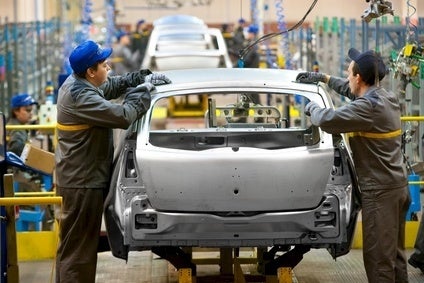
Analysts at LMC Automotive have revised down forecasts for the Russian car market this year in the wake of a deteriorating outlook for the Russian economy in part caused by the fallout from the geopolitical crisis in Ukraine.
LMC said that it now expects car sales this year to decline by ‘at least 8%’ versus a previous forecast for a 2-4% drop.

Discover B2B Marketing That Performs
Combine business intelligence and editorial excellence to reach engaged professionals across 36 leading media platforms.
LMC noted the Russian authorities have announced that they have scrapped plans to support the car market via another loan interest subsidy scheme during 2014. Similar schemes were introduced in 2009 and 2013 and were helpful in reviving the car market, LMC said.
However, LMC warned that a bleaker scenario for Russia’s car industry would follow any extension of economic sanctions by the West. It said that such a development would squeeze the economy by accelerating capital flight and prompting a further run on the rouble “triggering a severe tightening of monetary policy”.
Under such conditions LMC said the car market could decline by at least 10-15% and possibly by as much as 20% in 2014.
Hopes that Russia’s car market might overtake Germany’s in 2014 have long since evaporated and the latest cut to LMC’s forecast means that the timetable for Russia to become Europe’s largest car market has already slipped to the end of the decade at best, LMC said.
The analysts at LMC also said that industry will be adversely impacted by currency movements. The rouble has weakened by 10% against the euro since the beginning of the year, making imported goods and components much more expensive. This, LMC points out, exposes component suppliers selling into Russia as well as companies producing in Russia who still rely heavily upon imported components.
In spite of the expansion in Russian car production in recent years, the share of imported cars increased in 2013, meaning that they accounted for almost 36% of the market, LMC notes. A further 46% of sales were accounted for by producers building foreign-branded cars in Russian plants and for some of these vehicles, local content is still relatively low.
Conversely, the currency movement could help domestic producers as they will benefit from the currency depreciation by becoming more competitive. Russian sales for the largest producer, AvtoVAZ, fell by 19% in the first two months of 2014, but because its cars feature a low proportion of imported components, the brand may be able to claw back some lost market share in the coming months as its rivals are unable to avoid substantial price hikes, LMC said.






